American Bureau of Shipping
The American Bureau of Shipping (ABS) is a leading global provider of classification and technical advisory services to the marine and offshore industries. Established in 1862, it is one of the oldest classification societies in the world. ABS is headquartered in Houston, Texas, USA.
Primary Functions and Services
Classification
ABS classifies ships and offshore structures, ensuring they comply with specific standards related to design, construction, and operational maintenance. Classification is the cornerstone of ABS’s activities. The process includes:
- Review and approval of design plans
- Surveys during and after construction to confirm adherence to standards
- Periodic inspections throughout the lifecycle of the asset
Certification
ABS provides certification services for various regulations and standards, ensuring that marine assets meet international and national safety requirements. This includes:
- Safety Management Systems (SMS) under the International Safety Management (ISM) Code
- International Ship and Port Facility Security (ISPS) Code
- Maritime Labour Convention (MLC) compliance
Technical Advisory and Consultancy
ABS offers advisory services to help clients enhance the performance and operational efficiency of their assets. This includes:
- Risk assessment and management
- Environmental compliance
- Energy efficiency and sustainability initiatives
- Data-driven decision-making using digital technologies and analytics
Research and Development
ABS invests significantly in research and development to stay at the forefront of industry trends and technological advancements. This helps them to offer forward-thinking solutions for emerging challenges in the marine and offshore sectors.
Industry Focus
ABS serves a wide range of sectors including:
- Commercial shipping (tankers, bulk carriers, container ships, etc.)
- Offshore energy (oil and gas platforms, wind farms, etc.)
- Government and military vessels
- Yachts and leisure craft
Digital Solutions
In recent years, ABS has incorporated digital technologies to provide smart solutions for asset management. This includes:
- Remote survey and inspection capabilities
- Condition-based monitoring and maintenance
- Integration of Internet of Things (IoT) for real-time data collection and analytics
Global Presence
ABS operates globally, with a network of offices and surveyors in major port cities around the world. This allows them to provide timely and localized services to their clients.
Commitment to Safety and Environmental Stewardship
A core part of ABS’s mission is to promote safety at sea and the environmental sustainability of marine and offshore operations. They collaborate with industry stakeholders to develop and refine standards that protect human life, property, and the environment.
Affiliations and Subsidiaries
ABS is part of the ABS Group of Companies, which provides risk management and technical services to a wide range of sectors beyond marine and offshore, including power and energy, manufacturing, and government services.
Leadership and Reputation
With a history of over 160 years, ABS has a well-established reputation for quality, reliability, and continuous improvement. Its leadership in the field is backed by its rigorous approach to technical standards and its proactive stance on innovation and sustainability.
For more information, you can visit their official website at www.eagle.org.
Ships and so on
- Phone: Li
- Web: www.eagle.com
- Fax: 281-877-6795
Locations
American Bureau Of Shipping News
ABS, DOE to examine Nuclear Energy for Commerical Maritime
The U.S. Department of Energy (DOE) has awarded ABS a contract to research barriers to the adoption of advanced nuclear propulsion on commercial vessels.The $800…
Largest Container Ship in the World Delivered to ABS Class
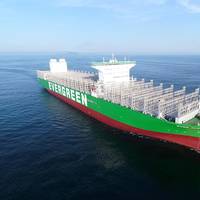
The EVER ALOT, the largest container ship in the world, with just over 24,000 teu capacity, has been delivered to ABS class.The vessel is the latest in a series of nine being built by Hudong-Zhonghua Shipbuilding in China to ABS class. The 400-meter megamax-24 type ship will serve ports between Asia and Europe.“We are proud to support the design, construction and successful delivery of such a remarkable vessel through the challenges of the pandemic.
Keppel Offshore & Marine Ammonia Bunker Vessel Get ABS AIP
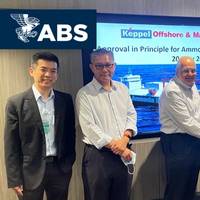
ABS issued approval in principle (AIP) to Keppel Offshore & Marine for the ammonia-fueled ammonia bunker vessel at the heart of Project Sabre, an initiative from a consortium of organizations to develop an ammonia bunker supply chain in Singapore.As well as ABS, the consortium includes A.P. Moller – Maersk, Fleet Management Limited, Keppel Offshore & Marine, Maersk Mc-Kinney Møller Center for Zero Carbon Shipping, Sumitomo Corporation, Kawasaki Kisen Kaisha, Ltd.
SpaceX, ABS Ink JDP on Remotely Controlled Rocket Recovery Droneships
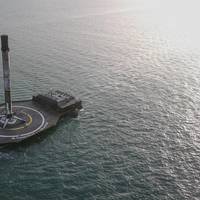
SpaceX and ABS signed a joint development project (JDP) to review the remotely controlled functions of autonomous rocket recovery droneships used for booster rocket recovery at sea.The rocket recovery droneships are modified to include an expanded deck to increase the size of the landing platform, four thruster engines for propulsion and to hold on station, and blast shielding to protect electrical and engine equipment on deck.
2050 Not Achievable Without Carbon Capture, says ABS' Wiernicki

“Carbon capture is going to be a key transformational technology for shipping to achieve net zero emissions by 2050. It will be critical to addressing the challenge before us, which is the sheer gradient of the curve. At the moment we can only see the outline of a solution to get us to 2050. But it is clear already that net zero cannot realistically be delivered without efficient carbon capture and storage technology,” said Christopher J.
SHI Ammonia-Fueled Neo-Panamax Container Ship earns ABS AIP
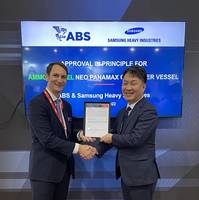
ABS granted approval in principle (AIP) to Samsung Heavy Industries’ (SHI) design for an ammonia-fueled Neo-Panamax container vessel.Presented in Athens, Greece, at the Posidonia International Shipping Exhibition, the AIP confirms the design has been reviewed by ABS against the requirements outlined in the ABS Guide for Ammonia Fueled Vessels. “This ammonia-fueled vessel represents a significant step…
Enauta's Atlanta FPSO to Be Operated Under ABS Class
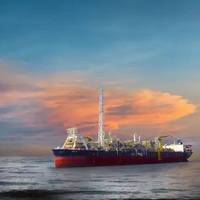
The FPSO Atlanta, contracted by the Brazilian oil company Enauta to Malaysia's Yinson for conversion to service the Atlanta Field offshore Brazil, will be operated under ABS Class.The Atlanta, which will serve as the Definity Production System at the Atlanta Field in the Santos Basin, offshore Brazil, is being converted in Dubai Drydocks World, including structural upgrades, refurbishment and enhancement of equipment…
ABS Grants AIP for F&G-Designed COSCO Wind Turbine Installation Vessel
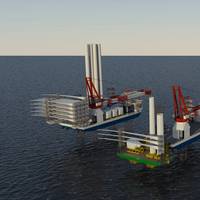
American Bureau of Shipping (ABS) has granted Approval in Principle (AIP) for a design for a wind turbine installation vessel (WTIV) for China Ocean Shipping Company Limited (COSCO) by Friede and Goldman (F&G).According to ABS, the design is suitable for all offshore wind markets and is capable of installing 15 MW and larger-sized turbines. It can be equipped with F&G’s BargeRack feeder barge system to support Jones Act-compliant operations in the U.S.
First in Middle East: Aramco’s Survey Vessel Gets ABS' Infectious Disease Mitigation Notation
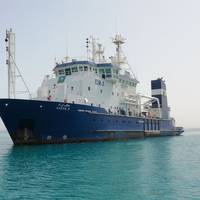
Aramco’s hydrographic survey vessel, KARAN 8, has become the first in the Middle East region and second worldwide to be awarded an ABS Infectious Disease Mitigation (IDM) notation.ABS' IDM-A notation is offered to vessels that meet the arrangement requirements addressing the configuration of spaces that can be used for the isolation and segregation of crew, passengers, and onshore visitors, as well…
Using Storage Tanks from Older LNG Carriers Could Boost FLNG Production
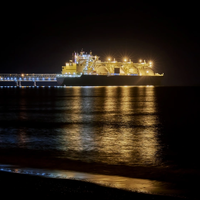
Maritime and offshore classification society American Bureau of Shipping (ABS) has granted its approval in principle (AIP) for an innovative concept for a floating LNG (FLNG) vessel utilizing storage tanks from older LNG carriers. The design, jointly developed by Kawasaki Kisen Kaisha, Ltd. (“K” LINE) and JGC Corporation (JGC), supported by Japan’s Ministry of Land, Infrastructure, Transport and Tourism…
Maju 510 Tug: Singapore's First Autonomous Vessel Project Complete
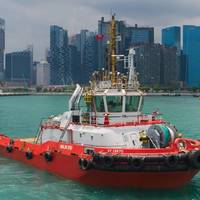
Singapore's Keppel Offshore & Marine said Thursday it had completed work on the Maju 510 tug, its first autonomous vessel project."Capable of autonomous vessel navigation as well as collision detection and avoidance (CDCA), the Maju 510 tug, owned and operated by Keppel Smit Towage, is the first vessel in the world to receive the Autonomous Notation from ABS classification society," Keppel O&M said.According to Keppel O&M…
ABS Withdraws Class Services for Russian Vessels
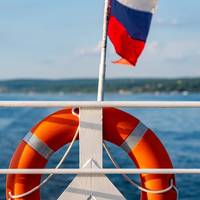
The America Bureau of Shipping (ABS), one of the world's largest ship classification societies, is withdrawing all class services involving Russian vessels, assets and companies, over the Russian invasion of Ukraine."After careful consideration of the situation in Ukraine and the Black Sea as well as the applicable sanctions, ABS has taken the decision to withdraw all Class services involving Russian vessels…
Digitalization: From Stem to Stern, Ship Design in 3D Digital
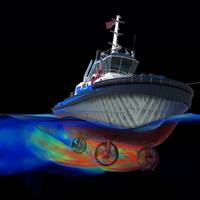
3D digital design can save ‘dollars on the deck plate’ during construction while maintaining safety, says to Patrick Ryan, Senior Vice President, Global Engineering and Technology, ABS.Last year ABS, Robert Allan, Signet and USCG collaborated on a project that would be the first commercial vessel in U.S. history to be produced using only 3D models in design and construction for all structures. While the process used to deliver this RAL-designed Advanced Rotortug (ART) is historic…
'New Era in Dry Bulk Shipping': First Bunker Fueling for EPS' LNG-Fueled Bulker
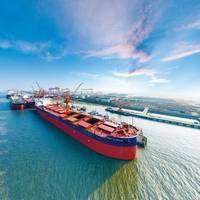
Eastern Pacific Shipping's first LNG-fueled Newcastlemax bulk carrier in an order of 13 ABS-Classed vessels, has recently taken on its first load of LNG bunker fuel at Singapore.The 209,936 DWT dual-fuel vessel, Mount Tourmaline, was built by Shanghai Waigaoqiao Shipbuilding Co., Ltd., China, and delivered to EPS on January 28, 2022.Captain Anil Singh, EPS Chief Operating Officer said: “Our fleet of…
ABS to Class First Jones Act-compliant Subsea Rock Installation Vessel
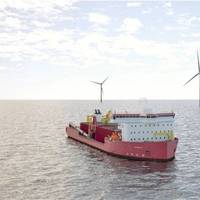
The Great Lakes Dredge & Dock Company's new Jones Act-compliant Subsea Rock Installation Vessel, the first such ship to enter the U.S. market, is to be built to ABS Class by Philly Shipyard, Inc, ABS said Thursday.The vessel will transport and strategically deposit loads of up to 20,000 MT of rock on the seabed, laying scour protection for offshore wind farm foundations, cables, and other structures.
Digitalization: Simulating Cleaner Shipping

Technologies developed and deployed in pursuit of net zero bring environmental and societal benefits for shipping owners and operators to outweigh their own emissions.SIM is a technology with the potential to make a significant contribution to maritime decarbonization, writes Patrick Ryan, ABSOne of the biggest problems for shipowners seeking to understand how environmental regulation will impact the performance of their fleets in future is uncertainty.
ABS Launches Floating Production Life Extension Guide
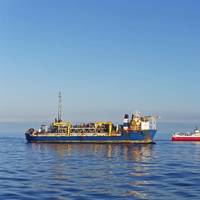
American Bureau of Shipping has further developed its approach to aging offshore assets with the publication of the Guide for Life Extension of Floating Production Installations.ABS said that the guidance supported operators looking to extend the operational life of a floating production installation (FPI) by outlining clear Class requirements with a focus on safety. It is informed by lessons learned…
Future Fuels: Alfa Laval Earns ABS AIP for Firing Boilers with Methanol

The American Bureau of Shipping (ABS) granted Alfa Laval the first marine approval for operating boilers on methanol.“Alfa Laval is looking at the full scope of methanol’s influence on board,” says Lars Skytte Jørgensen, Vice President Technology Development, Energy Systems, Alfa Laval Marine Division. “The most natural choice for boilers is to fire them with the vessel’s primary fuel, but methanol’s…
SHI Demos SENSE IV, Its Own Natural Gas Liquefaction Process
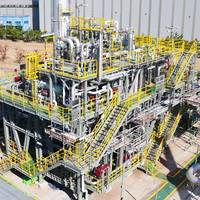
Samsung Heavy Industries announced on November 18 that it successfully held a demonstration ceremony at the Geoje shipyard for "SENSE IV (SAMSUNG Enhanced Nitrogen Split Exapnsion IV)", SHI's in-house natural gas liquefaction system.The demonstration, which began on November 16, was attended by several major LNG producers and classification societies.The natural gas liquefaction system, called "An LNG plant on the sea…
FPSOs: Floating Ideas
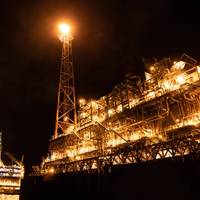
The world’s FPSO fleet is getting older, with 55 FPSO units in the global fleet reaching the end of their design life in the next five years, with an additional five having life extension in place. With 19 more FPSOs currently being evaluated for life extension, safety issues and structural integrity concerns come to the fore? Matt Tremblay, ABS Vice President, Global Offshore, explains the challenges for FPSO operators…







